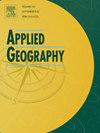Climate Gaps: Disparities in residential air conditioning access across ten US metropolitan areas
IF 4
2区 地球科学
Q1 GEOGRAPHY
引用次数: 0
Abstract
Due to climate change, human exposure to extreme urban heat is intensifying the need for residential cooling. We examine social disparities in access to residential air conditioning (AC) across ten United States Metropolitan Statistical Areas (MSAs). Using data from the 2021 Metropolitan American Housing Survey (n = 17,502) in multilevel multivariable models, we examine the correlation of AC (in)accessibility with housing unit-level race/ethnicity, household income, housing tenure, building type, and housing age, as well as MSA-level summer temperature. We advance previous studies by focusing on MSAs, using household-level data, and considering new covariates. Black and Hispanic vs. White householders are more likely to lack AC and more likely to have window vs. central AC. Asian households are less likely to have window vs. central AC than are Whites. Compared to high-income households, low-income and middle-income households are more likely to lack AC and to have window vs. central AC. Compared to single-family homeowners, single-family and multi-family renter-occupants are more likely to lack AC and to have window vs. central AC. Social groups at greatest risk of negative heat-related health outcomes also have worse AC access and lower-quality AC access in U.S. cities, which is likely attributable to systemic racism and economic marginalization.
求助全文
约1分钟内获得全文
求助全文
来源期刊

Applied Geography
GEOGRAPHY-
CiteScore
8.00
自引率
2.00%
发文量
134
期刊介绍:
Applied Geography is a journal devoted to the publication of research which utilizes geographic approaches (human, physical, nature-society and GIScience) to resolve human problems that have a spatial dimension. These problems may be related to the assessment, management and allocation of the world physical and/or human resources. The underlying rationale of the journal is that only through a clear understanding of the relevant societal, physical, and coupled natural-humans systems can we resolve such problems. Papers are invited on any theme involving the application of geographical theory and methodology in the resolution of human problems.
 求助内容:
求助内容: 应助结果提醒方式:
应助结果提醒方式:


